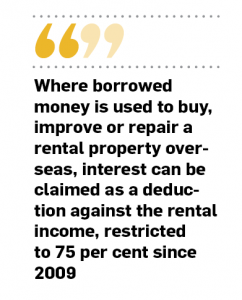
BUYING property overseas can be a taxing nightmare if unprepared, or smooth sailing around the Bay of Biscay – possible, just know the route. First up is getting a grip on myriad State obligations, from any initial loan used to buy a place, to tax paid on rental income, to interest relief breaks.
Property page offers a guide, driven by Revenue obligations for 2016, on what lies ahead should you invest overseas. The first in this series looks at the acquisition of property, be it for holiday home, rental or as primary residence; and whether it is bought or inherited.
Bear in mind that different countries have different laws governing tax on acquisition, rental income, sale and inheritance. The employment of a local lawyer in that country, directly and by yourself, who specialises in conveyancing and is multilingual will be invaluable.
Tax related to purchase
THERE is no obligation to notify Revenue of your purchase, but to buy overseas invariably requires the setting up of a bank account there. You have to notify Revenue of this on the year’s tax return and that the money used to buy the property has been fully declared for tax purposes. Ensure that all due taxes have been paid, whatever the source of this money.
If you borrowed, the money used to repay the loan must also be declared.
Any interest relief?
RELIEF is connected only as to whether the overseas property is your sole or principal residence, the ‘Home’. If home is located in Northen Ireland or the UK, you can claim relief but not through our familiar TRS system. The property can also be used by a former or separated spouse or dependent relative who lives there on a no-rent basis.
There’s no mortgage interest relief on a loan to buy a holiday home or investment property.
Where borrowed money is used to buy, improve or repair a rental property overseas, interest can be claimed as a deduction against the rental income. This has been restricted to 75 per cent since 2009.
Forget claiming VAT back as the property was not purchased here.
Inheritance:
BEST see an accountant or solicitor for this calculation. If you or your benefactor is usually living in Ireland, the inheritance will be subject to Irish capital acquisitions tax (CAT). The amount payable will depend on your relationship to the person and any previous gifts or inheritances you have received.
Paying CAT at home and abroad? According to Revenue, the only Irish double taxation agreements that cover CAT are those with the UK and the USA. If your gift or inheritance has already been subject to the equivalent of CAT in those countries, you can claim a credit for the tax paid in those jurisdictions up to the amount of your Irish tax liability.
The double taxation agreement with the USA only covers federal equivalents of CAT rather than similar taxes imposed by individual states. If your gift or inheritance was subject to the equivalent of CAT in a jurisdiction other than the UK or the USA, where a double taxation treaty covering gift tax or inheritance tax is not in force, you can still claim a credit for the tax paid in that foreign jurisdiction. This is valid up to the amount of your Irish CAT liability and Revenue will allow the credit for the foreign tax paid on a unilateral basis.
Stamp duty:
NONE to be paid if the transfer document to the purchase of the foreign property is executed abroad. Neither are you eligible for first time buyer relief is you have previously purchased a property anywhere.
Company purchase:
IF YOU purchase a foreign rental property through a company that either owns or acquires the property, you will not be entitled to interest relief if you have borrowed to fund the purchase. This is because you are buying an interest in the company rather than the property itself.
Interest relief is only available where the borrowed money is used to buy a rental property directly.
Look to a future Limerick Post Property page on taxes on rental income from an overseas property, and tax relief on fit-outs and repair.



